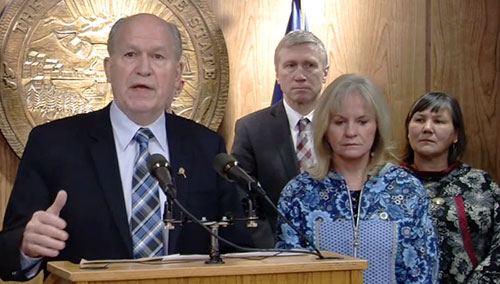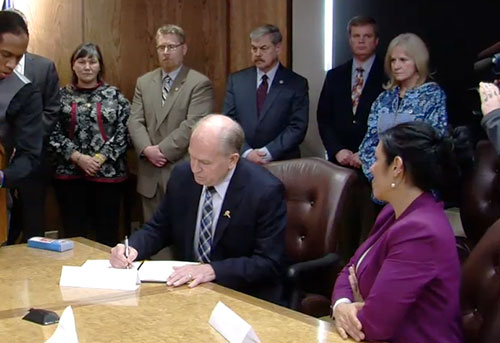
Governor Outlines Plan To Address State's Epidemic Opioid and Heroin AbuseBy MARY KAUFFMAN
February 17, 2017
“This disaster declaration is an important first step in addressing our public health crisis, which has devastated too many Alaskan families,” Governor Walker said Wednesday. “When earthquakes, fires or floods claim lives and property on a large scale, a declaration of disaster is issued to prioritize the state’s response. This is no different. We must stop this opioid epidemic. My order ensures that our resources are properly allocated to tackle this challenge. However, this is only the first step. It provides a temporary solution; we must work on a long-term fix.”
Governor Walker announcing the next steps in addressing the state’s opioid epidemic. Also pictured is First Lady Donna Walker, Alaska Dept. of Corrections Commission Dean Williams, and Alaska Department of Health and Social Services Commissioner Valerie Davidson.
Administrative Order 283 declares the abuse of opioids as a major public health issue and includes a directive for the Department of Public Safety to identify the ways illegal drugs are brought in Alaska and to pursue improved screening and enforcement measure to stop the trafficking of illegal drugs. Walker’s administrative order also directs all state departments to apply for federal grants to help fund prevention and treatment options; the elimination of illegally imported drugs; assistance with prescription drug monitoring; and development of resources to provide medical treatment in Alaska. Governor Walker has implemented an Incident Command System, which will be headed up by Alaska’s Chief Medical Officer, Dr. Jay Butler. These actions follow the Governor’s February 14 disaster declaration, which enables emergency responders outside the state’s chain of command to administer the lifesaving drug, naloxone. “Heroin and opioid addiction is a disease that knows no socioeconomic or cultural barriers. The sad truth is most of us knows someone affected by this public health crisis,” said Governor Walker. “As we take steps to mitigate this disaster, we must do so with compassion for those on the road to recovery. We need all hands on deck to tackle this problem and build a safer Alaska.” Alaska’s rates of heroin and opioid abuse have dramatically increased in recent years. From 2009 to 2015, the number of heroin-related deaths in the state quadrupled. Additionally, deaths related to the use of synthetic opioids such as fentanyl have now been documented in Alaska.
Governor signs Administrative Order 283 (pdf) “I want to thank Governor Walker and Commissioner Davidson for their state disaster declaration, which will put significant resources forward to combat the opioid epidemic harming too many families and communities across Alaska,” said Senator Sullivan. “All stakeholders - federal, state, local – must work together to advance efforts for prevention, emergency response, and treatment as well as reduce the stigma attached to addiction. I look forward to working with the Overdose Response Program and the many other programs and associations throughout the state combatting addiction of any kind.” In October of 2015, eight Alaska women who had struggled with addiction visited with Senator Sullivan in his Washington, DC office, and served as the inspiration for the Alaska Wellness Summit: Conquering the Opioid Crisis. Last August, Senator Sullivan hosted the Summit, which featured the U.S. Surgeon General and U.S. Department of Health and Human Services Deputy Secretary. Since then, the U.S. Senate, with the support of Senator Sullivan, has passed the Comprehensive Addiction and Recovery Act (CARA), and the 21st Century Cures Act–which included $1 billion over two years for states to combat the opioid crisis. Senator Sullivan has also had multiple meetings with former and incoming high ranking officials within the U.S. Department of Health and Human Services, and remains dedicated to stymieing the crisis through education, reduction of stigma, support for programs like Project HOPE, and expansion of accessibility to treatment. The members of the Alaska House Majority Coalition also commended Governor Walker for his decision to sign a disaster declaration for the worsening opioid epidemic in Alaska. The disaster declaration allows a statewide program under the direction of Alaska’s Chief Medical Officer to facilitate the distribution of the life-saving drug naloxone, which is used to revive overdose victims and sets up an Incident Command System and directs all state departments to apply for federal grants to respond to the opioid epidemic. “The scope of the drug abuse problem in Alaska is in many ways the worst in the nation and warrants a disaster declaration,” said Speaker of the House Rep. Bryce Edgmon (D-Dillingham). “I pledge the support of the Alaska House Majority Coalition to do whatever we can to help the Governor and our first responders who are on the front lines of this epidemic.” In recent years, Alaska’s rates of opioid abuse, including heroin, have increased dramatically; leading to a quadrupling of the number of heroin-related deaths from 2009 to 2015. The epidemic has been exacerbated by the introduction of new synthetic drugs and the availability of opioids in every region of the state. “The abuse of illegal drugs like heroin is devastating families and ruining futures. I support efforts to increase the availability of treatment and hope our fiscal challenges can be managed without damaging cuts to the resources needed now more than ever to respond to this epidemic,” said House Majority Leader Rep. Chris Tuck (D-Anchorage). “Treatment is one side of the equation, the other side is law enforcement. I will be working to make sure the state has enough Troopers and cities have enough police officers to cut off the sale and importation of illegal drugs into Alaska.” Representative Charisse Millett (R-Anchorage) also expressed her gratitude to Governor Walker and the Department of Health and Social Services for opening the door to additional assistance by declaring Alaska’s opioid epidemic a state disaster. “Opioid addiction and overdose are ravaging our state and risking the future of our next generation. I’m proud of Governor Walker for recognizing, like many of us, that silence will not end this cycle of drug abuse, and treatment, prevention, and emergency response capabilities are needed in our state,” said Representative Millett. “My colleagues and I in the Legislature are poised and ready to work with the Overdose Response Program created by this declaration and to help enact the kind of policies that will help end this crisis,” said Millett. Millett is the sponsor of a bill this year, House Bill 24, to outlaw the use and sale of U-47700, an incredibly dangerous synthetic form of heroin. This bill is part of an important package of recommendations from the Alaska Opioid Policy Taskforce whose goal is to address the rising incidence of heroin and opioid abuse in Alaska.
On the Web:
Source of News:
Representations of fact and opinions in comments posted are solely those of the individual posters and do not represent the opinions of Sitnews.
|
||

